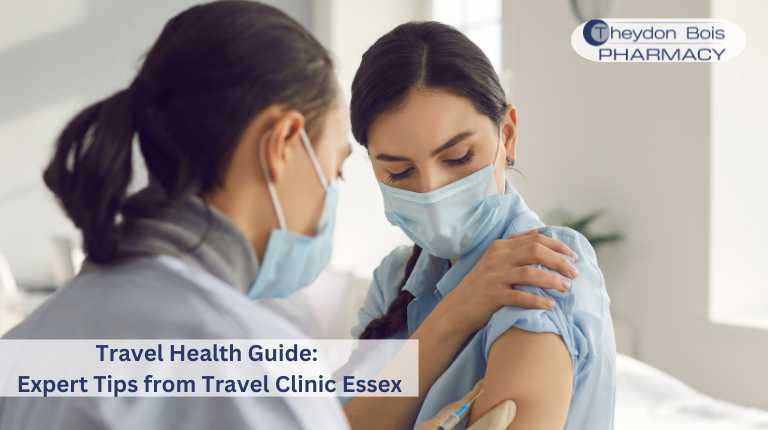Introduction
Traveling to beautiful, exotic destinations is always exciting. From exploring new cultures to savoring unique cuisines, every trip promises unforgettable experiences. However, international travel also has health risks, such as unfamiliar climates and different food or water standards.
A visit to a travel clinic can help you prepare for these challenges. With expert advice, vaccinations, and preventive care tailored to your trip, you can focus on enjoying your journey without worrying about your health.
This guide will explore how travel clinics are vital in keeping you safe and ready for any adventure.
Why Travel Health Matters
When traveling abroad, it’s vital to remember that every region of the world comes with unique health risks. For instance, tropical climates may expose you to diseases like malaria or yellow Fever, while food and water contamination can lead to illnesses such as hepatitis A or typhoid. Even experienced travelers can encounter unexpected health issues in unfamiliar environments.
Preparation is not just about protecting yourself—it’s about ensuring you can fully enjoy your trip without interruptions. Imagine planning a dream vacation, only to fall ill because of something preventable. Taking proactive steps protects your health and ensures the safety of those around you, as some diseases, like measles, can spread to others if you’re not vaccinated.
How a Travel Clinic Helps Make Your Travel Plan Safe
Vaccinations are a cornerstone of travel health. A reliable travel vaccination clinic offers different types of vaccines required for other regions you plan to visit. Key vaccinations include:
- Yellow Fever is required for entry into many African and South American countries. To meet official requirements, get vaccinated at least 10 days before departure.
- Hepatitis A and B protect against infections from contaminated food, water, or blood, which is common in several destinations.
- Typhoid vaccine is essential for travelers heading to areas with poor sanitation where food or water contamination poses significant health risks.
- Rabies is recommended for high-risk activities, such as trekking or working with animals in rural regions.
Beyond vaccinations, a travel clinic provides preventive medications and expert guidance. For example, they offer:
- Malaria Prophylaxis: Tailored advice and prescriptions based on your destination and trip duration.
- Altitude Sickness Medications: For trips to high-altitude areas.
- Traveler’s Diarrhea Prevention: Practical tips and medications to manage food- and water-borne illnesses.
Essential Travel Health Tips for a Safe Journey
Traveling can be an exciting adventure, but preparation is key. These practical tips ensure a safe and enjoyable trip:
Preventing Common Illnesses
- Stick to bottled water and thoroughly cooked meals to avoid illnesses like traveler’s diarrhea and hepatitis A.
- Use insect repellent, wear protective clothing, and sleep under mosquito nets in regions prone to malaria or dengue fever.
- Carry hand sanitizers and masks to reduce exposure to respiratory infections in crowded areas.
Managing Long Flights and High Altitudes
- Stay hydrated, move periodically, and wear compression socks to minimize the risk of deep vein thrombosis (DVT) on long flights.
- Consult your travel clinic about medications and acclimatization tips for high-altitude destinations to prevent altitude sickness.
Packing Essentials
- Insect repellent, sunscreen, and hand sanitizers.
- A basic first aid kit with pain relievers, antiseptic cream, and adhesive bandages.
- Destination-specific items, such as antimalarial pills or altitude sickness medications.
Special Considerations for Families, Seniors, and Chronic Illness Management
- Families: Ensure children are vaccinated and pack child-specific items like oral rehydration salts and motion sickness remedies.
- Seniors: Keep vaccinations up-to-date, particularly for flu and pneumonia, and carry any necessary medical devices.
- Chronic Illnesses: Bring a sufficient supply of medications and research healthcare facilities at your destination.
How to Schedule and Prepare for Your Travel Clinic Visit
Scheduling your travel clinic visit is straightforward and ensures a safe trip. Ideally, you should book your appointment at least 4–6 weeks before departure. This timeline allows vaccines to take full effect and provides enough time for any required multiple doses. If your trip is approaching quickly, many clinics offer last-minute appointments to provide essential vaccinations and advice.
When booking, prepare your travel itinerary, including countries, dates, and planned activities. Sharing this information helps the clinic identify destination-specific risks. Bring your vaccination history, current medications, and details about chronic conditions to ensure tailored care.
During your visit, the clinic will review your travel plans and medical history to recommend and administer vaccines like yellow Fever or typhoid. They may also prescribe preventive medications, such as antimalarials, ensuring comprehensive protection for high-risk areas.
Ensure Travel Safety With Reliable Travel Clinic in Essex
Your journey begins long before you board a plane—it starts with being prepared. A visit to Theydon Bois Pharmacy and Travel Clinic in Essex ensures you’re ready to embrace every moment of your trip without worrying about preventable health risks.
Our team goes beyond the basics, offering personalized advice, vaccinations, and preventive care tailored to your travel needs. From tropical getaways to business trips, we ensure you’re fully protected for every journey.
Don’t leave your health to chance. Book your appointment with Theydon Bois Pharmacy and Travel Clinic today, and travel confidently and safely.
Visit our Google Business Profile for more customer reviews and details about our services.

